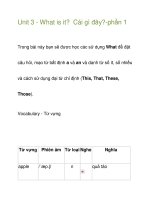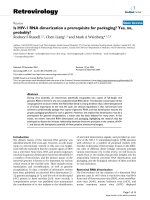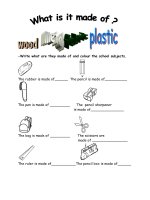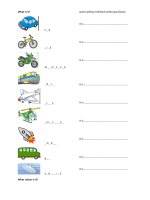powerpoint presentation guessing game what is it 1 it’s a festival 2 it’s a time for families to be together 3 it occurs in late january or early february tet guessing game who is that 1 he is a ma
Bạn đang xem bản rút gọn của tài liệu. Xem và tải ngay bản đầy đủ của tài liệu tại đây (722.16 KB, 33 trang )
<span class='text_page_counter'>(1)</span><div class='page_container' data-page=1></div>
<span class='text_page_counter'>(2)</span><div class='page_container' data-page=2></div>
<span class='text_page_counter'>(3)</span><div class='page_container' data-page=3>
• What is it ?
1. It’s a festival.
2. It’s a time for families to be together.
3.It occurs in late January or early February.
<b>Tet</b>
</div>
<span class='text_page_counter'>(4)</span><div class='page_container' data-page=4>
Who is that?
1. He is a man.
2. He teaches us how to love, cry and laugh.
3. His feelings for us are so strong that the
world love can’t describe them.
<b>A father</b>
</div>
<span class='text_page_counter'>(5)</span><div class='page_container' data-page=5>
• <sub>What is it?</sub>
1. It is a song.
2. It is sung on New year’s Eve.
3. Another name of a song is The Good Old
days.
<b>Auld Lang Syne</b>
</div>
<span class='text_page_counter'>(6)</span><div class='page_container' data-page=6>
Adverb clauses of concession
Relative clauses
LANGUAGE
FOCUS
</div>
<span class='text_page_counter'>(7)</span><div class='page_container' data-page=7>
<b>I. RELATIVE CLAUSES:</b>
Ex: Tet is a festival. Tet occurs in late
January or early February.
Tet is a festival which occurs in late
January or early February.
Ex: Tet is a festival. Tet occurs in late
January or early February.
Monday, March 8 th, 2010
<b>UNIT 8: CELEBRATIONS</b>
</div>
<span class='text_page_counter'>(8)</span><div class='page_container' data-page=8>
<b>1</b>
<b>2</b>
<b>3</b>
<b>4</b>
</div>
<span class='text_page_counter'>(9)</span><div class='page_container' data-page=9>
1. Join the sentences. Use relative clauses:
a. Auld Lang Syne is a song. Auld Lang Syne
is sung on New Year’s Eve.
</div>
<span class='text_page_counter'>(10)</span><div class='page_container' data-page=10>
1. Join the sentences. Use relative clauses:
b. This watch is a gift. The watch was given
to me by my aunt on my 14 th birthday.
</div>
<span class='text_page_counter'>(11)</span><div class='page_container' data-page=11>
1. Join the sentences. Use relative clauses:
c. My friend Tom can compose songs. Tom sings Western folk songs
very well.
</div>
<span class='text_page_counter'>(12)</span><div class='page_container' data-page=12>
1. Join the sentences. Use relative clauses:
d. We often go to the town cultural house. The town cultural house
always opens on public holidays.
</div>
<span class='text_page_counter'>(13)</span><div class='page_container' data-page=13>
1. Join the sentences. Use relative clauses:
e. I like reading books. Books tell about different peoples and their cultures.
</div>
<span class='text_page_counter'>(14)</span><div class='page_container' data-page=14>
1. Join the sentences. Use relative clauses:
f. On my Mom’s birthday my Dad gave her roses. The roses were
very sweet and beautiful.
On my mom’s birthday my dad gave her
roses, which were very sweet and
</div>
<span class='text_page_counter'>(15)</span><div class='page_container' data-page=15>
1. Join the sentences. Use relative clauses:
g. Judy liked the full-moon festival very much. The festival is celebrated in mid-fall.
</div>
<span class='text_page_counter'>(16)</span><div class='page_container' data-page=16>
1. Join the sentences. Use relative clauses:
h. Tomorrow I’ll go to the airport to meet my friends. My friends
come to stay with us during the Christmas.
</div>
<span class='text_page_counter'>(17)</span><div class='page_container' data-page=17>
<b> 2. Describe each of the people in the </b>
<b>pictures. Use relative clause.</b>
I am the boy who is wearing a white T-shirt.
</div>
<span class='text_page_counter'>(18)</span><div class='page_container' data-page=18>
<b> II. Adverb clauses of concession</b>
.
What do we
use for?
What do we
use for?
What
are
they?
What
are
they?
They are though, although,
eventhough
</div>
<span class='text_page_counter'>(19)</span><div class='page_container' data-page=19>
3. Join the sentences. Use the words in
brackets.
a.Thu Ha isn’t satisfied with her preparations
for Tet. Thu Ha has decorated her house
and made plenty of cakes. (eventhough)
</div>
<span class='text_page_counter'>(20)</span><div class='page_container' data-page=20>
3. Join the sentences. Use the words in
brackets.
b. We don’t have a Mother’s Day in VietNam.
Dad and I have special gifts and parties for
my mom every year on the 8th of March.
(although)
b. Although we don’t have a Mother’s
</div>
<span class='text_page_counter'>(21)</span><div class='page_container' data-page=21>
3. Join the sentences. Use the words in
brackets.
c. We went to Hanoi to watch the parade on
National Daylast year. We live in Nam
Dinh. (eventhough)
c. We went to Hanoi to watch the parade
on National Daylast year eventhough
</div>
<span class='text_page_counter'>(22)</span><div class='page_container' data-page=22>
3. Join the sentences. Use the words in
brackets.
d. Many tourists enjoy festivals in Vietnam.
Tourists do not understand Vietnamese
culture very much. (though)
d. Many tourists enjoy festivals in Vietnam
</div>
<span class='text_page_counter'>(23)</span><div class='page_container' data-page=23>
3. Join the sentences. Use the words in
brackets.
e. In Australia,Christmas season is in the
summer. The Australia enjoy Christmas as
much as people in European countries do.
(even though)
</div>
<span class='text_page_counter'>(24)</span><div class='page_container' data-page=24>
3. Join the sentences. Use the words in
brackets.
f. Jim could see the main part of the show.
He came to the show late due to the traffic
jam. (although)
f. Although Jim could see the main part of the
show. He came to the show late due to the
</div>
<span class='text_page_counter'>(25)</span><div class='page_container' data-page=25>
4: Look at the pictures. Complete the sentences.
Use the correct tense of the verbs and the
information.
help / Tuan / homework
</div>
<span class='text_page_counter'>(26)</span><div class='page_container' data-page=26>
watch / TV
b. Even though Liz has an exam
</div>
<span class='text_page_counter'>(27)</span><div class='page_container' data-page=27>
weather bureau / predict / fine weather
c. It rained yesterday although ………
bureau predicted the weather would be
fine.
</div>
<span class='text_page_counter'>(28)</span><div class='page_container' data-page=28>
eat / lot / food
d. Ba ………though he wasn’t
very hungry.
</div>
<span class='text_page_counter'>(29)</span><div class='page_container' data-page=29>
finish /letter
</div>
<span class='text_page_counter'>(30)</span><div class='page_container' data-page=30>
c. which
a. who b. whose
2. That is the book ……he bought yesterday.
Multiple choice:
1. He is the man …… was helped last night.
a. who b. whom c. which
3. We could do the test …..it was very difficult.
</div>
<span class='text_page_counter'>(31)</span><div class='page_container' data-page=31></div>
<span class='text_page_counter'>(32)</span><div class='page_container' data-page=32>
• Remember:
-Rewrite the answers in your notebooks.
</div>
<span class='text_page_counter'>(33)</span><div class='page_container' data-page=33></div>
<!--links-->









